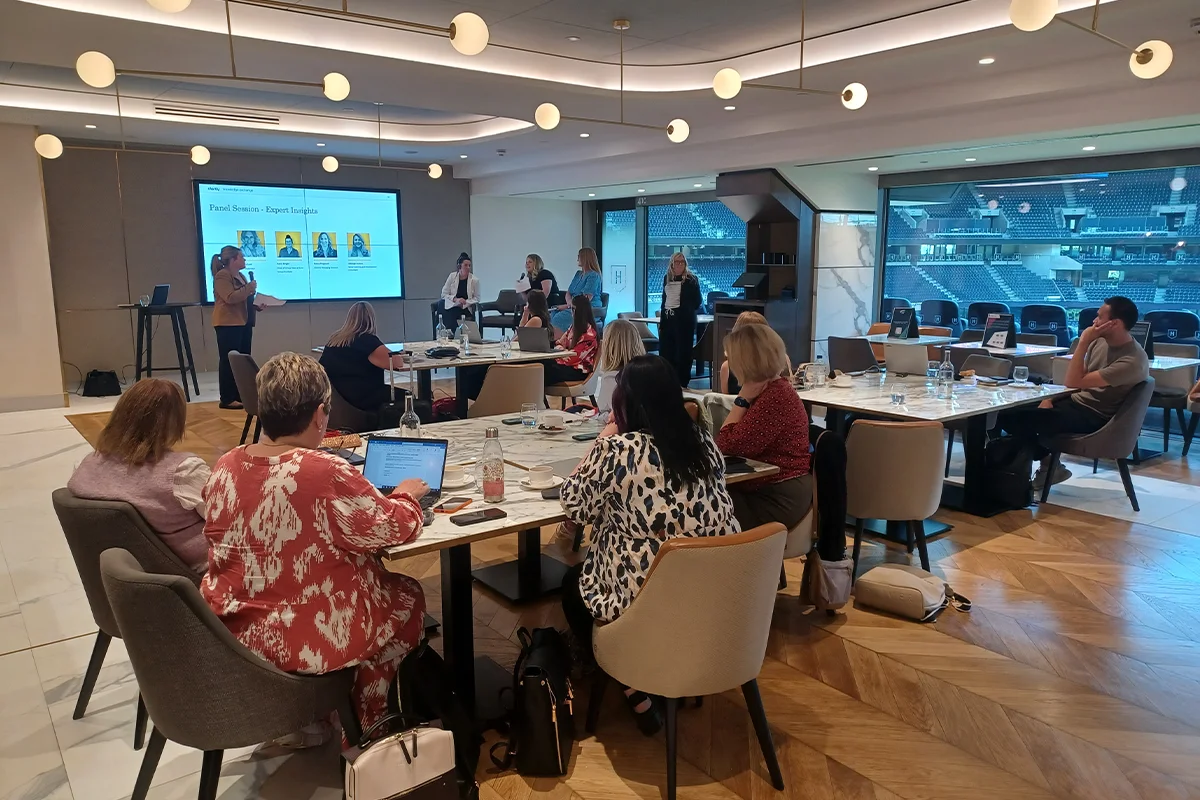Latest news, views and experts insight in business travel and meetings
Show Filter
Hide Filter
Thank you! Your submission has been received!
Oops! Something went wrong while submitting the form.
Tag
Showing 0 of 100

Championing career growth through mentorship and Talent Academy
Read about how we champion careers through support and opportunity
In The News
Read more
Our people
Careers

To Tender or not to Tender? That is the question.
Expert advice on what good looks like when it comes to tendering.
Blog
Read more
Blog
Expert insight
Hints & Tips

Clarity and PwC recognised for excellence at ITM Awards 2025
Celebrating strategic meeting success with PwC
In The News
Read more
Meetings
News
Awards

Driving inclusivity in business travel
Neurodiversity recently took pole position at our latest Knowledge Exchange - read all about it here.
In The News
Read more
Wellbeing
Business travel
Duty of care

A new era of personalised air travel: Inside Lufthansa’s Allegris experience
Read our latest guest blog from Lufthansa and how their making air travel all about you.
Blog
Read more
Blog
Supplier updates

Hacks for travel managers
How to find your zen when it comes to travel management.
Blog
Read more
Business travel
Traveller trips
Travel manager

Clarity Named Finalists for multiple People Awards 2025
We're thrilled to share that we've been shortlisted!
In The News
Read more
Awards
Our people

Guest blog: Elevate your experience with United Polaris
Find out how you can take your travel to the next level with United.
Blog
Read more
Supplier updates

From chaos to coordination: How TMCs mitigate business travel disruption
The calm before, during and after the storm.
Blog
Read more
Account management
Duty of care
Wellbeing

Success for Clarity at Greengage Sustainability Awards 2025
And the results are in!
In The News
Read more
Awards
Sustainability

Traveller tips: The real-life value of using a Travel Management Company (TMC)
Helpful tips and tools to support you on every trip.
Blog
Read more
Hints & Tips
Traveller

From Chaos to Clarity: The real value of a TMC
Smarter travel and meetings management starts with the right TMC partner.
Blog
Read more
Account management
Disruption management
Business travel

Double win for Clarity at the CN Agency Awards 2025
We walked in with two nominations – and skipped away with two awards.
In The News
Read more
Business travel
Awards
Events
Meetings
Meetings tech

Join us at the Business Travel Show Europe 2025
The Business Travel Show Europe and The Meetings Show are back at ExCel London 25-26 June 2025 and we'd love to see you at stand K41!
In The News
Read more
Business Travel Show
Business travel
Travel management

Why the entertainment & media industry needs a travel partner that gets it
Seamless travel management for productions, tours, and VIPs-stress-free, on time, every time.
Blog
Read more
Travel management
E&M

Clarity named finalist for multiple sustainability awards
We're delighted to share that we've been shortlisted. Find out more below.
In The News
Read more
Awards
Sustainability

Clarity expand operations into the Nordics
Read all about our latest overseas adventure with One Global
In The News
Read more
Global travel
Business travel

Clarity launches specialist entertainment and media proposition
In The News
Read more
News
Account management
Travel management

Seating styles simplified: Choosing the perfect layout for your meetings and events
Keep reading to master meeting and event success with the right seating arrangement.
Blog
Read more
Meetings
Meetings tech

Top tips for booking better meetings
Read on to discover how small changes can make a big impact, making your meetings more productive, cost-effective, and comfortable for all.
Blog
Read more
Blog
Meetings
Travel management
Wellbeing
Traveller

Together We Thrive: Driving results and innovation at the 2024 Clarity customer conference
Discover how our 2024 conference inspired innovation, fostered collaboration and drove shared success for customers.
Blog
Read more
Account management
Customer service
Expert insight

Sustainability in Action: Accor’s inspiring Stories of Change
The latest guest blog from Accor discusses the amazing stories sustainability from across the globe.
Blog
Read more
Blog
Sustainability
Supplier updates

Shine bright in Toronto: Rewarding excellence across Clarity
From awe-inspiring experiences at Niagara Falls to forging strong team connections, discover how we honoured the exceptional contributions of our talented colleagues.
Blog
Read more
Awards
Clarity on tour
Our people

How our team were inspired to lead the sustainability charge
Read all about how we're inspiring our team to lead the charge on sustainable business travel.
Customer Stories
Read more
Account management
Business travel
Sustainability

Clarity and Greengage collaborate on innovative sustainability certification programme
Read all about how we enable sustainable booking with ECOsmart.
In The News
Read more
Sustainability
Travel technology

Clarity’s sustainability event sparks new working group
Read about our sustainability journey with customers, sharing insights from our ESG Knowledge Exchange.
In The News
Read more
Sustainability
Account management

Strategic Meetings Management: A no-fuss guide to smarter meetings
Smarter meetings with strategic planning, policy control and instant booking.
Blog
Read more
Meetings
Meetings tech

The A-Z of business travel: from suits to scrubs, we’re all travellers
Business travel supports all industries, from healthcare to engineering, ensuring seamless journeys for everyone.
Blog
Read more
Travel management
Business travel
Blog

Reflections from the Rock: My take on the BTA Autumn Conference in Gibraltar
The latest column from our Exec Director for Travel on her recent trip to the BTA Autumn Conference.
Blog
Read more
Our people
Business travel

Transforming financial processes and strengthening partnerships
A look at how we transformed financial processes reduce £2m of aged debt with our customer Siemens.
Customer Stories
Read more
Account management
Customer service

Clarity recognised by Siemens for financial project work
Read the big news about how we were highly commended by our customer during their supplier awards.
In The News
Read more
Awards
Customer service

Monolith mergers: Is there an alternative to the global megas of corporate travel?
Drawing on his experience of similar scale mergers, our CEO, Pat McDonagh, discusses how they impact competition in global corporate travel.
Blog
Read more
Global travel
Travel management
Business travel

Clarity adds new framework to public sector offering
We’re proud to join the RM6342 Crown Commercial Services Framework, further supporting public sector customers with seamless and cost-effective travel solutions.
In The News
Read more
Business travel
News
Customer service
Public sector

Hosting hotel insight event to support customers during RFP season
Over 60 industry pros joined us to explore hotel insights for the 2025 RFP season, with expert tips on balancing cost, guest wellbeing, and sustainability.
In The News
Read more
Account management
Business travel
Data and insights

Bite-sized insights: Essential advice for meal allowances
Is your business travel policy keeping up with the market? Our Head of Customer Insight, Lone Konradsen, offers her expert advice on keeping staff meal allowances up to date.
Blog
Read more
Data and insights
Expert insight
Travel management

Staying on top of rate caps: Timeless advice from our experts
We catch up with our Customer Insight Manager, Abby Taylor to hear what's happening with rate caps right now and what you can do stay on top of your rate caps.
Blog
Read more
Travel management
Expert insight
Data and insights

Elevating customer service in business travel
Fresh from a successful Business Travel Show session on customer service in our industry, we take a look at why it's so important.
Blog
Read more
Business Travel Show
Customer service

Navigating the changing landscape of travel management: TMC vs. integrators
The corporate travel landscape is changing, with new integrators offering flexible tech solutions. At Clarity, we help you navigate these options to find the perfect balance for your travel programme.
Blog
Read more
Travel management
Travel technology
Customer service
Expert insight

Centre Stage: Who is Lesley Smith, Operations Manager?
Our latest edition of Centre Stage with Lesley Smith puts our specialist Marine Team in the spotlight.
Blog
Read more
Careers
Our people
Marine

Take control of business travel with ClarityGo
ClarityGo simplifies corporate travel booking with control and visibility.
Blog
Read more
Travel technology

How Clarity helps improve travel policy compliance
Boost travel policy compliance with Clarity’s tech and expertise.
Blog
Read more
Customer service

Clarity bag two ITM Achievement Awards
The team bring home two out of four awards at the ITM Achievement Awards.
In The News
Read more
Awards
Our people
Customer service

Offshore travel management: Why energy companies need a specialist approach
Specialist travel support for marine, offshore and energy sector companies.
Blog
Read more
Marine
Travel management

People-centric service in the age of AI
Unlocking the balance: People-centric service in the age of AI
Blog
Read more
Blog
Travel technology

Navigating duty of care in marine travel
Protect marine crew worldwide with 24/7 duty of care support.
Blog
Read more
Marine
Duty of care

Clarity launches business travel platform ClarityGo
We’re set to unveil our new business travel platform, ClarityGo, at the Business Travel Show Europe for the first time.
In The News
Read more
News
Travel technology
Business travel

We’re back at the Business Travel Show Europe 2024
Meet us at the Business Travel Show Europe and The Meetings Show 2024 at ExCeL London! Join us at stand J41 to explore cutting-edge booking tech and global capabilities. Schedule a meeting today!
In The News
Read more
Business Travel Show
Business travel
Travel management

What to look for in a business travel company in 2024
Smarter business travel with tools, tech and trusted support.
Blog
Read more
Travel management
Business travel

We’re exhibiting at the UK Infrastructure Show 2024
The UK’s leading infrastructure and supply chain event is back this March, and we’re delighted to confirm we will be exhibiting at the show.
In The News
Read more
Travel management
Business travel

Offsetting rail fare increases: balancing traveller behaviour and policy
With the upcoming rail fare increase on 3 March 2024, which will see regulated fares increase by up to 4.9%, now is arguably the best time to review your business travel policy and what it says around booking rail.
Blog
Read more
Account management
Data and insights
Travel management

Clarity shortlisted for prestigious sustainability award
We are delighted to announce that we have been selected as a finalist in the 'Achievement in Sustainability - TMC' category for this year's Business Travel Sustainability Awards Europe.
In The News
Read more
Business travel
Sustainability
News

December was our highest Net Promotor Score in 2023
Clarity's year-end results highlight exceptional customer experience, with an NPS of 82 and CSAT of 97% despite travel disruptions.
In The News
Read more
Business travel
Customer service

Elevating L&G's travel experience with premium service
During the pandemic, Legal & General recognised the need for a Premium Service offering to provide personalised, high-touch travel booking for their Executive Board.
Customer Stories
Read more
Customer service
Travel management

Royal Mail Group’s journey to net-zero
Our 20-year partnership with Royal Mail Group has delivered a winning combination of sustainability, efficiency, and cost savings—boosting eTicket usage and slashing CO2 emissions.
Customer Stories
Read more
Account management
Sustainability
Travel management

Rail strikes and their impact on business travel budgets
Discover how UK rail strikes impact business travel budgets with increased costs, lost productivity, and strategic challenges. Learn how Clarity supports businesses with tailored solutions.
Blog
Read more
Business travel
Expert insight
Travel management
No results found.
There are no results with this criteria. Try changing your search.































